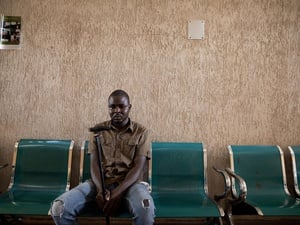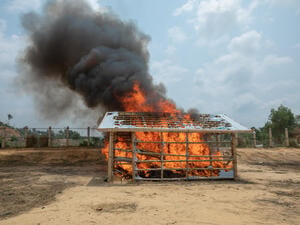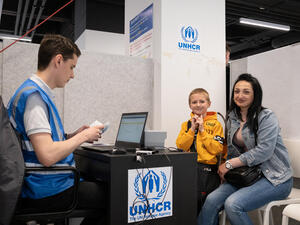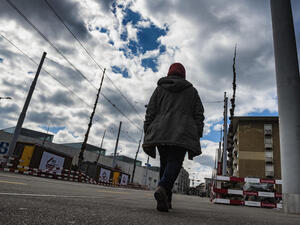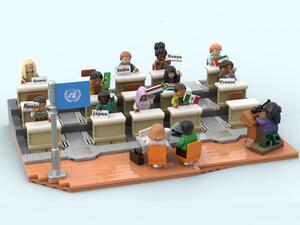UNHCR expands help to refugees in urban areas in Libya, reassesses role of Gathering and Departure Facility
UNHCR expands help to refugees in urban areas in Libya, reassesses role of Gathering and Departure Facility
UNHCR, the UN Refugee Agency, announced today that it is increasing its support to refugees and asylum seekers in urban areas of Libya and reassessing the role and functioning of the Gathering and Departure Facility.
“As the Libyan conflict intensifies, we have decided to expand the assistance provided to the refugees and asylum seekers living in urban areas,” said UNHCR’s Chief of Mission for Libya Jean-Paul Cavalieri.
There are already some 40,000 refugees and asylum-seekers living in urban areas, some of whom are extremely vulnerable and in desperate need of support. Humanitarian assistance to refugees and asylum seekers is available at our Community Day Centre (CDC) in Gurji, district of Tripoli, where those in need can access primary health care, registration and cash assistance to help meet food and accommodation needs.
The agency is also reassessing the role of the Gathering and Departure Facility (GDF), in light of severe and unsustainable over-crowding. The GDF was opened a year ago as a transit facility for vulnerable refugees and asylum seekers, mostly women and unaccompanied children at heightened risk in detention and for whom solutions outside Libya had been identified. These solutions remain very limited and require us to identify and prioritise the most acutely vulnerable people within a much broader population, many of whom are in great need. UNHCR and partners operate inside the facility, which is under the overall jurisdiction of the Ministry of Interior.
However, since July, following a deadly airstrike at Tajoura detention centre, hundreds of former detainees made their way into the GDF. They were followed by another group of around 400 people from Abu Salim detention centre in late October, as well as up to 200 people from urban areas. They are part of a broader population of asylum seekers, refugees, and migrants who are vulnerable and exposed to risks in Libya – but have not been prioritised for evacuation or resettlement.
The GDF is now severely overcrowded. It has capacity for around 600 people, but currently hosts nearly double that figure – many of whom have been there for several months. UNHCR, UN agencies and our partners have been providing them with humanitarian assistance, including medical care, psycho-social support, hot meals and high-energy biscuits. However, the situation at the GDF is unsustainable and it no longer functions as a transit facility, hampering UNHCR’s ability to evacuate the most acutely vulnerable refugees, for whom solutions outside of Libya have been found, out of detention centres and to safety.
“We very much welcome the release of asylum seekers and refugees from detention by the Libyan authorities, and are now expanding our programme of support in urban areas so that they can get the help they need,” said Cavalieri. “We are also encouraging partners and donors to step up support to urban migrants and other vulnerable communities.”
“We hope that the GDF will be able to return to its original function as a transit facility for the most acutely vulnerable refugees, so we are able to evacuate them to safety,” he added, while noting that the GDF has de facto become an “open centre” for urban migrants and asylum-seekers where UNHCR will continue to provide medical assistance and sanitation services for the foreseeable future, based on available resources.
With the broader package of urban assistance in place, UNHCR will phase out food catering at the GDF in the New Year. UNHCR will continue to inform and counsel individuals who informally entered the GDF about their options and the availability of the urban assistance package. Those with a valid claim for international protection are being offered the urban assistance package to help them move out, including emergency cash for an initial two months, relief items, access to primary health care and medical referrals. They will also be offered to meet with our staff to identify specific vulnerabilities and solutions. We continue to appeal for additional resources that would allow us to provide more substantial and sustained support.
Around 40 people have already agreed to this option, which does not rule out their eligibility for possible future evacuation or resettlement outside of Libya. For example, four individuals who accepted the package have been assessed as eligible for humanitarian evacuation following protection interviews.
The processing of individual cases, including protection assessments and identification of possible durable solutions outside Libya, will continue to take place at UNHCR’s Sarraj registration office, in order to ensure the integrity of UNHCR procedures.
UNHCR reiterates that options for resettlement remain unfortunately extremely limited, with the number of available resettlement places worldwide being far outstripped by the needs. Less than 1% of refugees identified by UNHCR as in need are able to be resettled each year. We urge the international community to come forward with more resettlement places and faster processes to help us evacuate more refugees in need of resettlement to safety.
For more information:
- In Tunis: Caroline Gluck [email protected] +216 299 25506
- In Tunis:Tarik Argaz, [email protected], +216 29 9612 95
- In Geneva: Charlie Yaxley, [email protected], +41 79 580 8702


